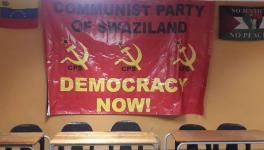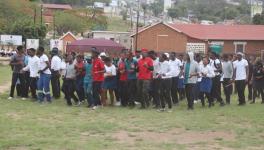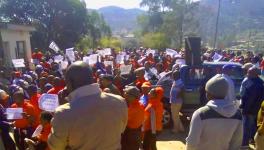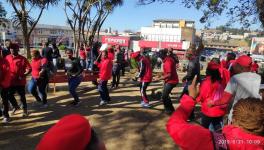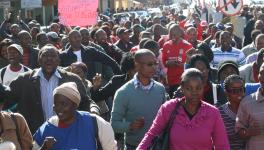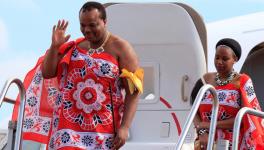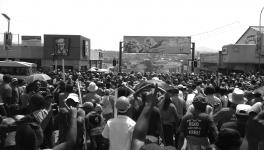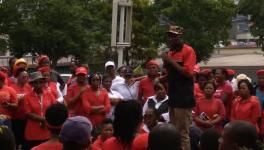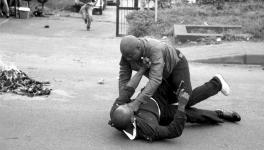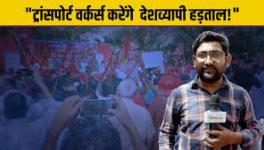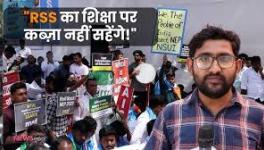Trade Unions in Swaziland Prepare for Next Stage of Strike
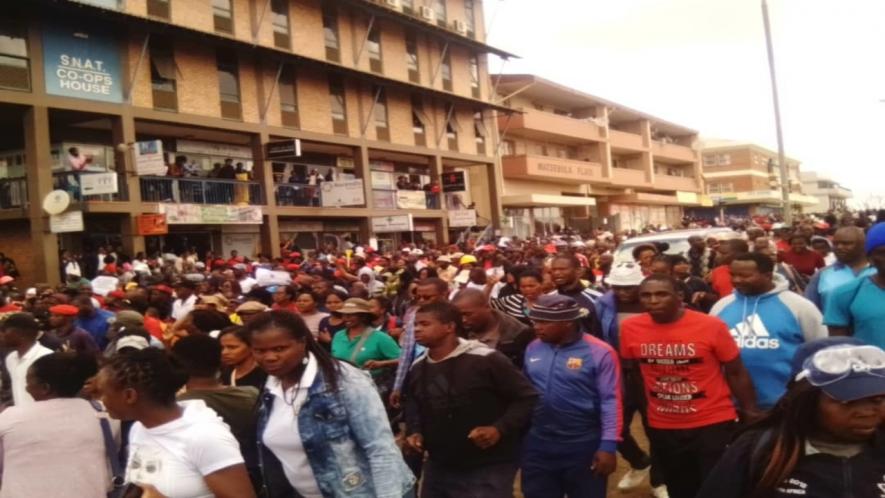
Civil servants took to the streets on a number of occasions between September 23 and October 3 despite police violence and provocations. Photo: Communist Party of Swaziland
Trade unions representing civil servants in Swaziland are preparing for “a major offensive” even as court hearings will soon commence on a government plea against their strike which began on September 23. The strike was called off on October 3 after an industrial court issued an interdiction. The unions called the strike after the government refused to heed their demand of a Cost of Living Adjustment (CoLA) of 7.8%
On October 2, as many as 17 demonstrators were injured when riot police attacked a demonstration of thousands of striking civil servants in Swaziland’s commercial hub of Manzini. The police used fired live bullets, tear gas and rubber bullets at the protesters.
Dumisani Nkuna, Manzini branch secretary of 7,600-strong National Public Service and Allied Workers Union (NAPSAWU), one of the three unions that participated in the industrial action, was shot in the back near the spinal cord with live rounds. After undergoing surgery on the night of October 3, he is in a stable condition, general secretary of NAPSAWU, Thulan Hlatsh, told Peoples Dispatch.
“One of the workers was so badly injured after her hand was pierced by a rubber bullet that there are fears that she may be disabled,” the People’s United Democratic Movement (PUDEMO), which is banned by Swaziland’s monarchical government for its pro-democracy activism, said in a statement.
The strike was called by the Public Servants Associations (PSAs) which comprises the NAPSAWU, the Swaziland National Association of Teachers (SNAT) and the Swaziland National Association of Government Accounting Personnel (SNAGAP) among others. The SNAT has a membership of 14,000 of the roughly 15,000 teachers employed in government schools and colleges while the SNAGAP counts as its members 500 of the roughly 800 government accountants.
While the Swaziland Nurses Association (SNA) is also a part of the PSAs, its members were prohibited from participating in the strike action on the grounds that their profession is categorized under “essential services”.
The unions are demanding a CoLA of 7.85% to compensate for the loss of real earnings due to rising prices since 2016, which was when the last CoLA was paid.
The government has made a counter-offer of 3% for the year 2020-21, provided the condition of the economy improves and the PSAs call off the strike. The unions, on the other hand, are unwilling to engage on the matter of 2020-21 right now, when the CoLA for the current year and the past two years has not yet been paid.
The PSAs have also expressed their willingness to engage with the government even if a 5% offer for the three years is tabled, even though that is well below what can offset the loss of income due to price rise. However, the government is refusing to pay any CoLA for three years – 2017-18, 2018-9 and 2019-20.
It maintains that the economic crisis Swaziland is going through does not allow it to afford the costs of meeting their demands. Unions have have pointed out that the economic crisis never seems to affect the millions spent on decadent indulgences of the royal family of king Mswati III, the last absolute monarch of Africa.
Recently, the government has “purchased gold toilets for Mswati worth $5.2 million.. [T]here were also a number of displays of reckless spending by the government in the [very] period in which the strike was on going”, Mcolisi Ngcamphala, an executive member of the Big Bend branch of SNAT and the deputy national chairperson of Communist Party of Swaziland (CPS), told Peoples Dispatch.
On September 25, two days after the strike began, the government unleashed its police forces against a demonstration in the capital city of Mbabane, injuring at least 15 civil servants with rubber bullets. However, the workers refused to be cowed down and soon, work at the revenue collection department, the central transport administration, immigration offices and other government departments was seriously affected.
Meanwhile, government-controlled newspapers carried editorials insinuating that the demand for CoLA was only a cover for an agitation whose primary motive was regime change – a criminal offense to be dealt under Supression of Terrorism Act. This claim was dismissed outright by the unions.
As the strike continued, the Conciliation Mediation & Arbitration Commission (CMAC) made another attempt to resolve the dispute by inviting PSAs and the Government Negotiating Team (GNT) for a meeting on September 30.
At this meeting, the GNT sought to have another meeting on October 1, after seeking a fresh mandate from the cabinet to put on the table an offer which can break the deadlock. Mcolisi said, “[This] meeting was scheduled for 5 pm. Earlier that day, at 10 am, the.. cabinet had met with school heads to force them to file affidavits.. to support a case [they were].. trying to build to interdict the strike action.”
At the meeting, “instead of bringing an improved offer.. The [GNT] came with the same rhetoric.” They said that the government, which is “cash strapped and in fiscal crisis”, cannot afford to meet their demands. After the unions aborted this fruitless meeting, just “outside the offices, they were met with officials from the Attorney General who served them with court papers applying for an interdict of the strike,” he said.
The strike was originally scheduled to begin on January 27, but was interdicted after the government claimed in court that the motives behind the industrial action were political.
After a six months-long hearing, the court, in its verdict in July, declared that the demands behind the strike action are “legitimate” and not of a “purely political nature.” It gave a go-ahead for the unions to file fresh strike notices.
Having moved to court again on October 1, the attorney general reportedly argued this time that the strike was against the “national interest” and damaged the economy. In his application to the court, the labor minister cited the violent clashes in which civil servants were injured by police firing as one of the reasons for the government to demand an interdiction.
Mcolisi maintains that it is a common practice for police in plain clothes to merge with the workers in their demonstrations and provoke clashes, which is then used by the police as an excuse to shoot and by the government to get the court to interdict strikes.
As per Section 89 of the Industrial Relations Act of Swaziland – which is among the worst ranked countries in respect for labor rights – when the labor minister makes such an application, “the strike action stops [first, and] the merits of his case are heard thereafter,” he explained.
Accordingly, the court has admitted the government’s case. The hearing will begin on October 17. Granting an interim interdict to the government, the court, whose top jurists are also appointed by the king, prohibited the unions from continuing strike action until it decides on the final verdict.
Calling on its members to report back to work on October 4, the PSAs said “our comrades are requested to [temporarily] retreat”, as the leadership is “planning for another major offensive.”
Get the latest reports & analysis with people's perspective on Protests, movements & deep analytical videos, discussions of the current affairs in your Telegram app. Subscribe to NewsClick's Telegram channel & get Real-Time updates on stories, as they get published on our website.









